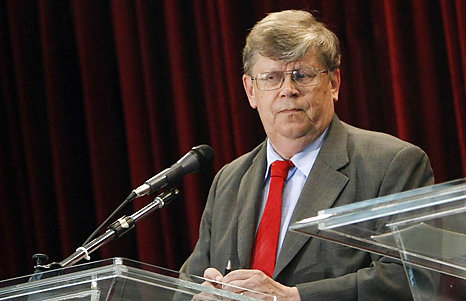JCPOA implementation will face ‘some turbulences’ in coming months, Heinonen claims

TEHRAN - Olli Heinonen, the former deputy director general for safeguards at the International Atomic Energy Agency (IAEA), argues although the implementation of the nuclear deal between Iran and great powers started well it will face some difficulties in the coming months.
“Implementation has started well, but I see some turbulences during the months to come,” Heinonen tells the Tehran Times.
Though both Russia and the U.S. have criticized UN chief Ban Ki-moon for his report of the implementation of the Security Council Resolution 2231, the former IAEA official defends the drafting of the report by saying “since the resolution calls Iran not to conduct tests with missiles designed for carrying nuclear weapons, the Secretary General apparently felt it necessary to express his views on the tests conducted by Iran during recent months.”
Both the U.S. and Russia said Ban had overstepped his mandate.
The Resolution 2231, which endorsed the July 2015 nuclear deal between Iran and great powers, calls upon Iran not to test missiles capable of carrying nuclear warheads.
Iran has been insisting that its missiles have not been designed to carry nuclear weapons.
The Resolution 2231 states: "Iran is called upon not to undertake any activity related to ballistic missiles designed to be capable of delivering nuclear weapons.”
In an interview with Radio New Zealand in March 2016, Iranian Foreign Minister Mohammad Javad Zarif said, “We stated when the nuclear deal was approved by the Security Council and during the course of nuclear discussions that we will continue with our defense capabilities and that these defense capabilities have nothing to do with nuclear weapons,” Zarif said.
Zarif also said Iran has “provided the best guarantee” that it would never develop nuclear weapons.
In a tweet posted on March 15, Zarif also said, “Neither JCPOA nor SC Res prohibit Iran from missiles not designed for nuke warheads. Read the document: It’s plain English not legalese.”
Neither #JCPOA nor SC Res prohibits Iran from missiles not designed for nuke warheads.
Following is the text of the interview with Heinonen:
Q: Ban Ki-moon, the UN secretary general, in his recent report claimed that the Iranian missile program is “not consistent” with the spirit of the Joint Comprehensive Plan of Action (JCPOA). Even the U.S. and Russia criticized Ban for the report, saying he had overstepped his mandate. What is your assessment of the report?
A: “The UNSC Security Council has requested the Secretary General to report on the implementation of the Council resolution 2231. Since the resolution calls Iran not to conduct tests with missiles designed for carrying nuclear weapons, the Secretary General apparently felt it necessary to express his views on the tests conducted by Iran during recent months. Views with regard to this particular paragraph appear to be at variance. Therefore, it is not, in my view, inappropriate that the Secretary General weighs in in this particular topic. It is now for the Security Council to decide, as the competent authority, whether the tests conducted by Iran constitute breach on its obligations under the resolution or not.
Q: The Associated Press recently claimed it has obtained a document that outlines Tehran’s plans to expand its uranium enrichment program after the first 10 years of the nuclear deal. It said that “confidential document eases Iran nuke constraints”. Why did the AP publish such a report at this time?
A: Several IAEA member states have asked more detailed implementation reports from the IAEA, which would demonstrate how Iran is meeting its obligations under the JCPOA and comprehensive safeguards agreement. The IAEA Board has a right to more comprehensive reporting under Article 5 of the safeguards agreement concluded between Iran and the IAEA. With such more detailed information the Board members can better assess on which facts the IAEA Secretariat is basing its conclusions on the implementation of the deal. The JCPOA is advertised as a transparent and robust undertaking. States or individuals, which have given information to AP, appear to prompt discussion on more transparent reporting, which in my view, would be indispensable in demonstrating the credibility of the deal.
Q: What is your assessment about the implementation of the JCPOA?
A: Implementation has started well, but I see some turbulences during months to come. Therefore, it is essential that the IAEA reporting is more detailed so that the member states can make their independent conclusions on the implementation of the agreement.
